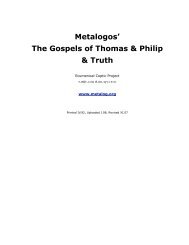Andrew Louth - Syriac Christian Church
Andrew Louth - Syriac Christian Church
Andrew Louth - Syriac Christian Church
Create successful ePaper yourself
Turn your PDF publications into a flip-book with our unique Google optimized e-Paper software.
MAXIMUS’ SPIRITUAL THEOLOGY 37<br />
the principles in accordance with which everything in the cosmos was<br />
created through the Word of God, the Logos. In the fallen world they<br />
are no longer clear to us: we tend not to see God’s meaning in the<br />
world and all its parts, rather we tend to see the world in relation to<br />
ourselves and read into it our meaning. As a result the world becomes<br />
an arena for human conflict, for we all see it differently, in a way that<br />
is focused on separated selves. To see the logoi of the natural order is<br />
to see it as it is and to be freed from our private prejudices, which are<br />
rooted in the disorder created in our hearts by the passions. It is also<br />
to understand the providence and judgment of God, as Evagrius puts<br />
it, that is to understand how God has constituted the cosmos as a kind<br />
of arena in which fallen souls learn how to turn back their attention to<br />
God. In this state of natural contemplation the mind begins to ‘see its<br />
own radiance’, 8 begins to be aware of its own contemplative powers.<br />
From this point on, the soul can progress to the final stage of<br />
contemplation of God, of theologia. This is the realm of prayer, which<br />
Evagrius regards as a state rather than an activity, not so much<br />
something you do as something you are. In this state the soul recovers<br />
its true nature: ‘the state of prayer is an impassible habit which<br />
snatches up the soul that loves wisdom to the intellectual heights by a<br />
most sublime love’. 9<br />
THE TRANSFORMATION OF EVAGRIUS<br />
Such, very roughly sketched, is the Evagrian pattern to which<br />
Maximus is deeply indebted. But it is not present in Maximus’<br />
writings unchanged. To begin with, behind Evagrius’ teaching on<br />
prayer and ascetic struggle there lay his ‘Origenist’ metaphysic, with<br />
which Maximus profoundly disagreed, and of which he was<br />
its greatest critic. But he was a critic with great sympathy for what he<br />
criticized, and extremely anxious not to throw out the baby with the<br />
bath-water. At the level of ascetic theology, Maximus is able to<br />
preserve most of what Evagrius taught, and he does. But he thinks it<br />
through again, and though many of the concepts and terms he uses<br />
are clearly Evagrian, what is expressed is no less distinctively<br />
Maximian. Thinking it through again partly means weaving into the<br />
Evagrian material themes from other traditions, especially that which<br />
stems from Denys the Areopagite, but also themes from the Macarian<br />
Homilies and from Diadochus of Photikê. But more deeply still,<br />
Maximus’ rethinking of Evagrian categories is manifest in the<br />
somewhat different spirit that emerges as he develops his ascetic<br />
theology.




